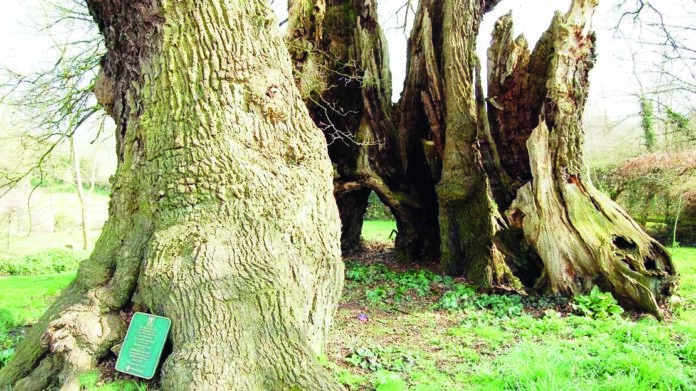A famed and ancient local oak is in the running to be tree of the year in a new contest.
The Woodland Trust competition has a shortlist including the historic Marton Oak, as well as an oak tree shaped like an elephant and the oak with the widest girth in the UK.
The trust runs the annual competition to raise awareness of the UK’s ancient and at-risk trees.
It said that a tree might be “a village’s oldest inhabitant, a founding figure in a region’s identity or a natural monument” and that trees were integral to a nation’s story.
Tress can also be much-loved local landmarks, places to play and exercise, a gardener’s pride and a space for communities to gather.
This year’s national contest celebrates oaks across the UK and the trust’s expert panel has shortlisted 12 oaks from across the UK for tree of the year 2024, for which people can vote and help us crown a champion.
The winner will represent the UK in the European tree of the year competition.
Marton Oak has a girth of 14.02m and is about 1,200 years old.
At a glance, the three hunks of standing wood may be mistaken for a trio of individual trees, but they are fragments of one enormous ancient oak.
One of the oldest and fattest oaks in the UK, the trust said it will have provided centuries-worth of vital food and shelter for wildlife, and may have been a source of essential firewood, construction materials and winter animal fodder for generations, too. It was selected in 2002 as one of 50 Great British trees to mark the late Queen’s golden jubilee.
Voting is open until 11.59pm on 21st October. The winner will be announced on 29th October.
With its 2024 contest, the charity is campaigning to ensure more robust legal protection for the country’s most precious trees, and is showcasing ancient oaks as they are a beloved species and often live for more than 1,500 years.
Oaks, the trust said, support 2,300 different species of wildlife, and the UK has more ancient oaks than the rest of western Europe combined.
Last year, a 480-year-old sweet chestnut in Wrexham that has withstood storms, firewood collectors and, increasingly, parties and picnics beneath its boughs won the accolade.
Past winners have fared less well: the Sycamore Gap tree (2016) beside Hadrian’s Wall was felled last year, and the Cubbington pear in Warwickshire (2015) was chopped down to make way for the HS2 railway line.
While 11 of the trees on the list were chosen by an expert panel, there is one public wildcard nomination: the Elephant oak at the Old Sloden enclosure in the New Forest.
This tree takes its name from its unusual shape, and was nominated by supporter Claire Sheppard, who said it was her favourite oak tree to photograph at Old Sloden.
Dr Kate Lewthwaite, citizen science manager at trust, said: “We chose the iconic oak because it captures people’s imaginations – from their leaves to their acorns, these trees are ingrained in our heritage – and the ancients are so impressive in terms of their sheer size and age. Some oaks that are alive today were already centuries old at the time of Queen Elizabeth I, or Charles Darwin.
“It’s humbling to think how many events these trees have lived through, and that reaching full maturity they can stand for hundreds of years as ancient trees – all the while continuing to provide vital habitat as they hollow and produce dead wood.
“Each individual oak is like a unique, miniature nature reserve. There are so many species that live and rely on them, and have evolved alongside them; it is incredible.”
The shortlist is:
• Marton oak, a sessile oak (quercus petraea);
• Bowthorpe oak, Lincolnshire, an English oak (quercus robur) about 1,000 years old;
• Gregynog oak, Powys, 500 years old;
• Queen Elizabeth oak, West Sussex, a Sessile oak (quercus petraea) between 800-1,000 years old;
• Skipinnish oak, Lochaber, Scottish Highlands, a sessile oak, age unknown.
• The Michael, Midlothian, about 1,000 years old;
• The Tea Party oak, Suffolk, an English oak, age unknown;
• King John oak, Somerset, about 1,000 years old;
• Darwin oak, Shrewsbury, 550 years old and close to The Mount, the childhood home of Charles Darwin;
• Capon tree, Scottish Borders, between 700 and 1,000 years old and one of the last surviving trees of the ancient Jedforest;
• The Castle Archdale oak, County Fermanagh, age unknown;
• Elephant oak, Old Sloden enclosure, Hampshire.
To vote, visit woodlandtrust.org.uk here
Sign in
Welcome! Log into your account
Forgot your password? Get help
Password recovery
Recover your password
A password will be e-mailed to you.





